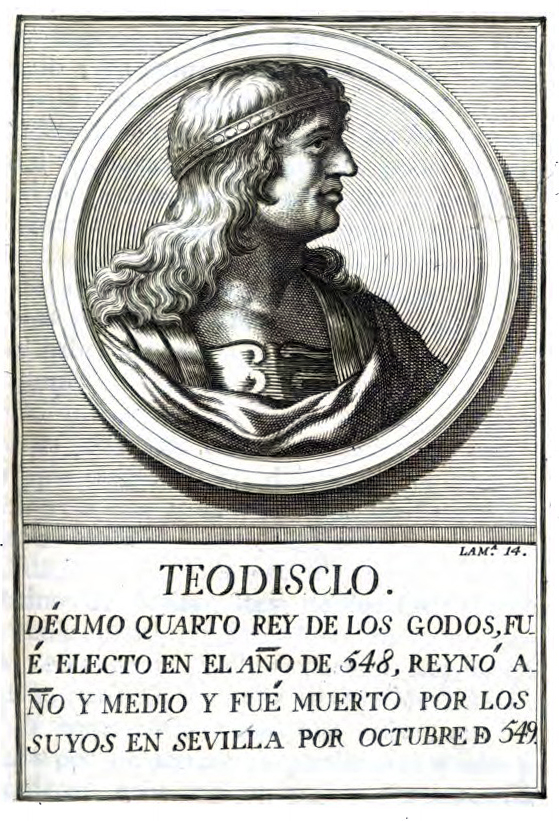Theudigisel on:
[Wikipedia]
[Google]
[Amazon]
 Theudigisel (or Theudegisel) (in
Theudigisel (or Theudegisel) (in
Latin
Latin (, or , ) is a classical language belonging to the Italic branch of the Indo-European languages. Latin was originally a dialect spoken in the lower Tiber area (then known as Latium) around present-day Rome, but through the power of the ...
''Theudigisclus'' and in Spanish
Spanish might refer to:
* Items from or related to Spain:
**Spaniards are a nation and ethnic group indigenous to Spain
**Spanish language, spoken in Spain and many Latin American countries
**Spanish cuisine
Other places
* Spanish, Ontario, Can ...
, Galician and Portuguese
Portuguese may refer to:
* anything of, from, or related to the country and nation of Portugal
** Portuguese cuisine, traditional foods
** Portuguese language, a Romance language
*** Portuguese dialects, variants of the Portuguese language
** Portu ...
''Teudiselo'', ''Teudigiselo'', or ''Teudisclo''), ( 500 – December 549) was king of the Visigoths
The Visigoths (; la, Visigothi, Wisigothi, Vesi, Visi, Wesi, Wisi) were an early Germanic people who, along with the Ostrogoths, constituted the two major political entities of the Goths within the Roman Empire in late antiquity, or what is ...
in Hispania
Hispania ( la, Hispānia , ; nearly identically pronounced in Spanish, Portuguese, Catalan, and Italian) was the Roman name for the Iberian Peninsula and its provinces. Under the Roman Republic, Hispania was divided into two provinces: Hispania ...
and Septimania
Septimania (french: Septimanie ; oc, Septimània ) is a historical region in modern-day Southern France. It referred to the western part of the Roman province of Gallia Narbonensis that passed to the control of the Visigoths in 462, when Septima ...
(548–549). Some Visigothic king lists skip Theudigisel, as well as Agila I, going directly from Theudis
Theudis (Spanish: ''Teudis'', Portuguese: ''Têudis''), ( 480 – June 548) was king of the Visigoths in Hispania from 531 to 548.
Biography
An Ostrogoth, he was the sword-bearer of Theodoric the Great, who sent him to govern the Visigothic king ...
to Athanagild
Athanagild ( 517 – December 567) was Visigothic King of Hispania and Septimania. He had rebelled against his predecessor, Agila I, in 551. The armies of Agila and Athanagild met at Seville, where Agila met a second defeat. Following the death of ...
.
Biography
Theudigisel was a leading Ostrogoth general of Theudis, and, when the latter was murdered, managed to make himself king. He had repelled theFranks
The Franks ( la, Franci or ) were a group of Germanic peoples whose name was first mentioned in 3rd-century Roman sources, and associated with tribes between the Lower Rhine and the Ems River, on the edge of the Roman Empire.H. Schutz: Tools, ...
from Spain after their invasion of 541, cutting them off in the pass of Valcarlos
Luzaide (Spanish: Valcarlos; official name Luzaide/Valcarlos) is a town in Navarre, northern Spain, located on the French border and just a few kilometers from the road frontier in the French village of Arnéguy.
Tradition holds that this is the ...
, but accepted a bribe to allow them to return to home.
According to Isidore of Seville
Isidore of Seville ( la, Isidorus Hispalensis; c. 560 – 4 April 636) was a Spanish scholar, theologian, and archbishop of Seville. He is widely regarded, in the words of 19th-century historian Montalembert, as "the last scholar of ...
, Theudigisel was assassinated because he "defiled the marriages of very many powerful men by public prostitution", and was assassinated by a group of conspirators during a banquet in Seville. Although he agrees that Theudigisel died during a banquet, Gregory of Tours
Gregory of Tours (30 November 538 – 17 November 594 AD) was a Gallo-Roman historian and Bishop of Tours, which made him a leading prelate of the area that had been previously referred to as Gaul by the Romans. He was born Georgius Florenti ...
records a different tale of his end: in the middle of the feast, the lights were blown out and an unidentified person killed Theudigisel in the dark. "The Goths had adopted the reprehensible habit of killing out of hand any king who displeased them and replacing him on the throne by someone they preferred," Gregory concludes.Gregory of Tours, ''Decem Libri Historiarum'', III.30. Translated by Lewis Thorpe, ''History of the Franks'' (Harmondsworth: Penguin, 1974), p. 187
References
549 deaths Assassinated Gothic people 6th-century murdered monarchs 6th-century Visigothic monarchs Year of birth unknown {{europe-noble-stub